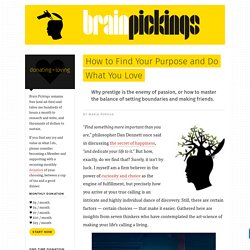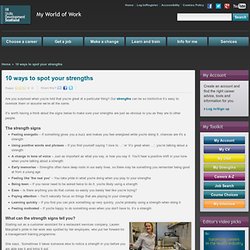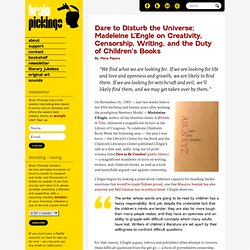

How to Find Your Purpose and Do What You Love. “Find something more important than you are,” philosopher Dan Dennett once said in discussing the secret of happiness, “and dedicate your life to it.”

But how, exactly, do we find that? Surely, it isn’t by luck. I myself am a firm believer in the power of curiosity and choice as the engine of fulfillment, but precisely how you arrive at your true calling is an intricate and highly individual dance of discovery. Still, there are certain factors — certain choices — that make it easier. Gathered here are insights from seven thinkers who have contemplated the art-science of making your life’s calling a living. Every few months, I rediscover and redevour Y-Combinator founder Paul Graham’s fantastic 2006 article, How to Do What You Love. What you should not do, I think, is worry about the opinion of anyone beyond your friends.
More of Graham’s wisdom on how to find meaning and make wealth can be found in Hackers & Painters: Big Ideas from the Computer Age. 16. 28. This is your life. What am I good at? - 10 ways to spot your strengths. Are you surprised when you’re told that you’re great at a particular thing?

Our strengths can be so instinctive it’s easy to overlook them or assume we’re all the same. It’s worth having a think about the signs below to make sure your strengths are just as obvious to you as they are to other people. The strength signs Feeling energetic – If something gives you a buzz and makes you feel energised while you're doing it, chances are it's a strength Using positive words and phrases – If you find yourself saying ‘I love to …’ or ‘It’s great when …’, you’re talking about a strength A change in tone of voice – Just as important as what you say, is how you say it. What can the strength signs tell you? Lauren Macphail Starting out as a customer assistant for a restaurant services company, Lauren Macphail’s pride in her work was spotted by her employers, who put her forward for a management training programme. 'Now I know my strengths I’ll be able to use them to help achieve the things I want to do.’
Brain Pickings. Brain Pickings - Part 2. By: Maria Popova “We find what we are looking for.

If we are looking for life and love and openness and growth, we are likely to find them. If we are looking for witchcraft and evil, we’ll likely find them, and we may get taken over by them.” On November 16, 1983 — just two weeks before her 65th birthday and twenty years after winning the prestigious Newbery Medal — Madeleine L’Engle, author of the timeless classic A Wrinkle in Time, delivered a magnificent lecture at the Library of Congress.
To celebrate Children’s Book Week the following year — the year I was born — the Library’s Center for the Book and the Children’s Literature Center published L’Engle’s talk as a slim and, sadly, long out-of-print volume titled Dare to Be Creative! L’Engle begins by making a point about children’s capacity for handling darker emotions that would’ve made Tolkien proud, one that Maurice Sendak has also asserted and Neil Gaiman has recently echoed. We find what we are looking for. With a riff on T.S.